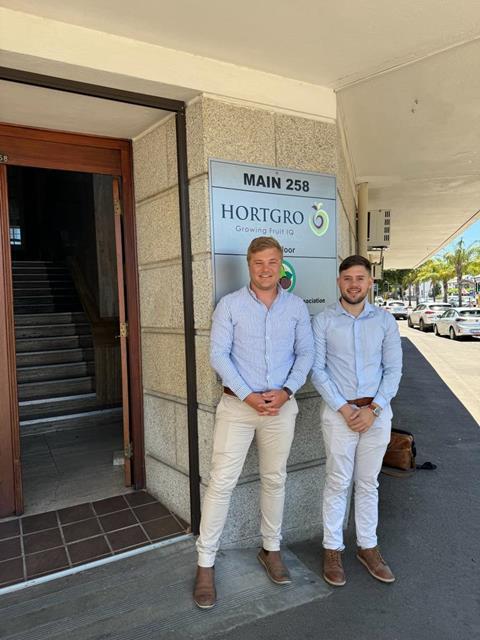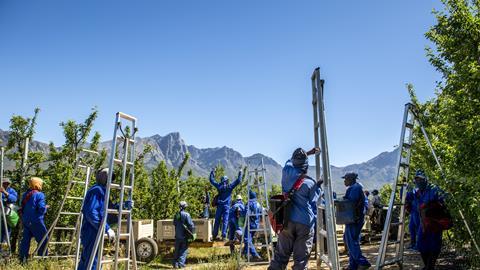The South African fruit industry says its answer to the proliferation of social and environmental certification schemes is rooted in realism and pragmatism
In South Africa, a land where water shortages and power cuts have underlined the finite nature of natural and man-made resources, and where ethical treatment of underprivileged people has defined the country’s very existence for as long as anyone can remember, awareness of the various environmental, social and governance factors that shape its fresh produce industry is high.
However, the South African fruit industry is also acutely aware of the need for a rational approach to environmental and social compliance, one that avoids placing unnecessary, unsustainable financial burdens on growers, suppliers and exporters.
For that reason, an independent certification body called the Sustainability Initiative South Africa (Siza) was set up 15 years ago to minimise the number of individual audits producers had to undertake, especially if they wanted to supply major retail customers in markets like Europe.
It says it has already saved the industry around R66m by removing the expense of those additional audits, which would otherwise have been required passports to entry demanded by clients in different markets.
“We maintain a hands-on approach with third-party auditors, and now recognise seven audit firms, each with a local office in South Africa,” notes Werner Van Dyk, Siza’s ethical and sustainability audit manager.
This represents progress, but other complications remain. “Several customers still see social and environmental standards as different and separate, which is something we find strange when those audits and fields of discipline are combined,” Werner adds.
Van Dyk rejects any suggestion that producers are looking to cut corners, even if they are determined to limit the cost of compliance.
For many, however, the financial burden involved in ticking the right boxes for the right buyers has risen sharply in recent years with the arrival of new rules and regulations – for example, new sustainability reporting standards implemented by the EU from the start of this year and soon to be introduced by the UK.
“We’ve seen an increase in social and environmental audits,” he explains. “Last year, we ran 732 social and 69 environmental audits. There is definitely an increase and it’s picking up quickly.”
Since 2015, audits commissioned by Siza have identified over 46,000 areas where improvement or corrective action was required. An impressive 96 per cent of these have already been resolved, Van Dijk points out.
“Producers are showing their commitment to continuous improvement, and this is evaluated and proven by the third-party audit outcomes: in the past year, 61 per cent of producers achieved platinum status and 25 per cent gold. We are definitely not anti-compliance, we are focused on improvement and best practice.”

A higher bar
Whereas compliance used to focus mainly on food safety, environmental standards are now a key component of most certification schemes.
As Siza’s sustainability officer Victor Mouton explains, the group’s environmental standard allows buyers to keep track of their own supply chain targets.
“We recently developed a net-zero guideline, a template they can use to work out best practice on water, pests, emissions, hourly wages, and worker accommodation,” he says. “The overwhelming majority of producers see the benefit of this, and see the results in terms of market access. They understand the need for certification and we help them meet it.”
Van Dijk also insists that smaller growers do not necessarily need to feel at a disadvantage when it comes to achieving full compliance without incurring major overheads.
“The real challenge for smaller growers lies specifically in the perception that it’s a lot more admin and requires a lot of staff,” he argues. “For the last five years, we have tried to highlight the fact that not everything has to be done on compliance like 15 years ago.
”You don’t need to keep huge large files and reprint them for each auditor. We help producers to develop auditing systems that suit their own business, especially online ones where everything is located in one digital hub. Digital record-keeping tools are now a more accessible means to that end.”
Fresh Focus South Africa

All this next week, Eurofruit is publishing a series of exclusive stories about the South African fresh produce trade. If you want to read more from my visit to the Western Cape and to learn how the province’s fruit growers and exporters plan to overcome some very big challenges, then you have two options: either click here and take out a digital subscribtion to Eurofruit; or head to the Fruitnet stand (Hall 5.2, A-50) at Fruit Logistica and pick up a copy of our Fresh Focus South Africa special, which is part of Eurofruit’s Fruit Logistica Edition · Part II.




